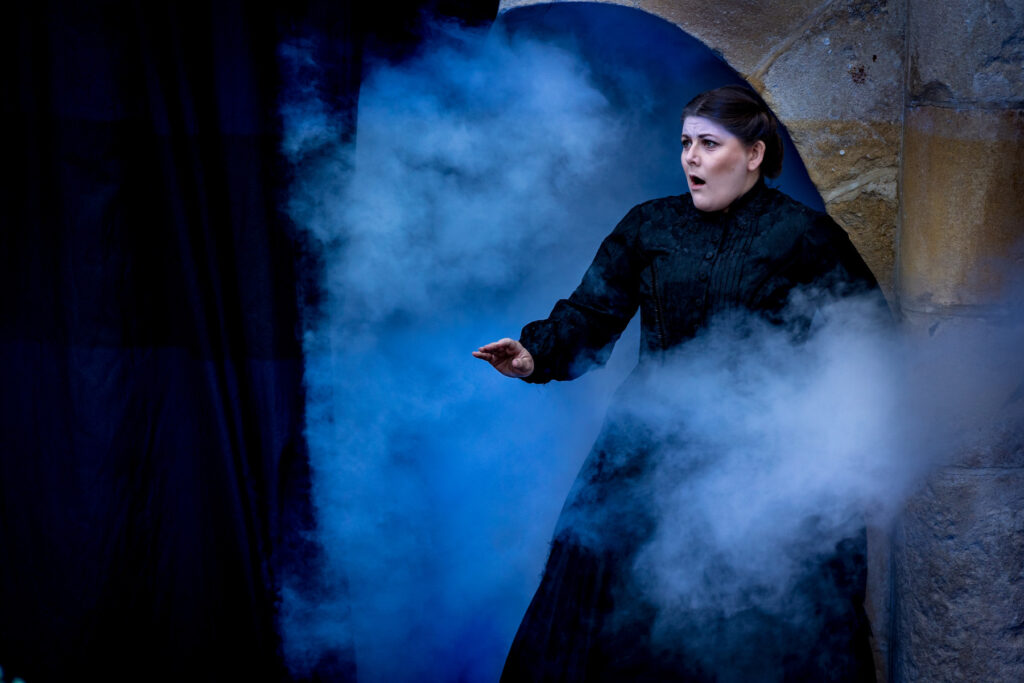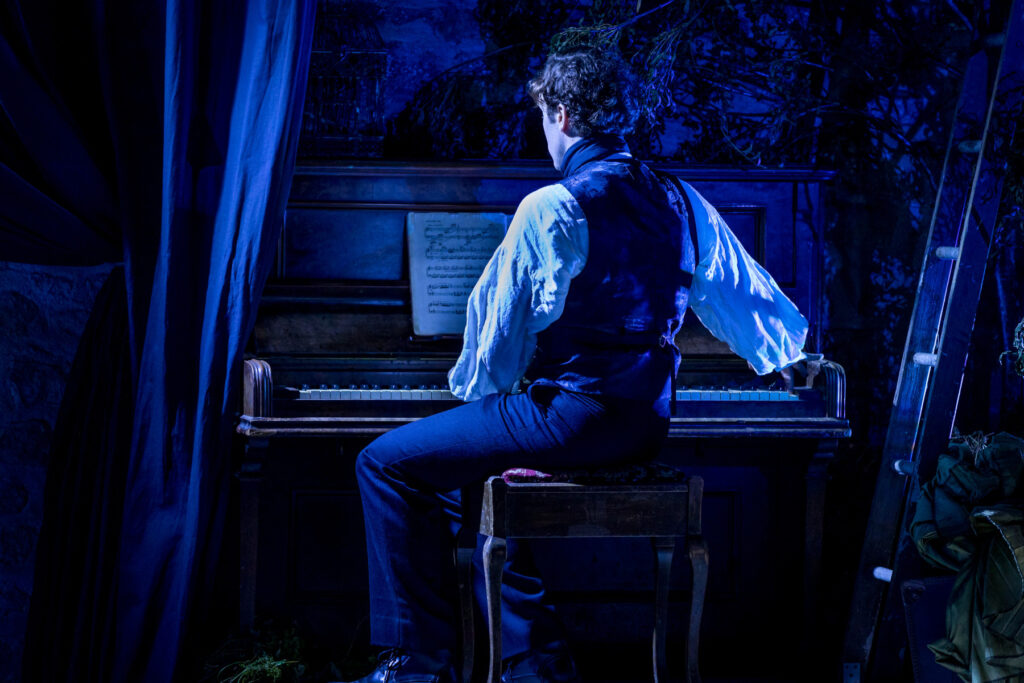No better choice could have been conceived for Waterperry Opera’s first foray into a full-length Britten opera than The Turn of the Screw. And no better performance space for its world of half lights and shadows than Waterperry’s secluded amphitheatre, a grade two listed folly, set within eight acres of landscaped gardens. With the onset of dusk, it makes for an especially atmospheric setting as darkness descends across the grounds, with ghostly silhouettes mirrored on stage. Twilight at Waterperry has never been so haunting. And whilst only partially glimpsed from the outdoor stage, the Regency grandeur of Waterperry House is an ideal double for the remote country house at Bly imagined by Henry James in his eponymous 1898 novella about orphaned children whose governess believes them to be prey to malign influences.
By necessity at Waterperry, The Turn of the Screw is given a minimalist staging, April Dalton’s set simply furnished with a single chair and a writing desk. They provide all you need to conjure for the schoolroom at Bly, the children’s bedroom and the Governess’s quarters. Surrounding trees create a sense of enclosure and hint at Bly’s gloomy towers, while a parapet above the stage provides the first ghostly glimpse of Quint. A child’s sailing boat and telescope make brief appearances, each suggesting an innocence later disturbingly dismantled when dead birds are unveiled in two grisly shrines – brilliantly exploiting the folly’s architecture.

Where director Rebecca Meltzer succeeds is in her largely non-interventionist approach, allowing the tale to speak for itself, leaving the personalities of the cast to weave their own way into our consciousness. She avoids imposing the answers to questions as to whether the children are possessed by evil spirits or tarnished by abuse. Her decision to garb Mrs Grose and Jessel in almost identical black dresses suggests two women with eerily similar facets. Is the housekeeper as blameless as we might ordinarily assume? Perhaps, it’s not just the children who are prone to corruption. And to what extent does the Governess herself want to possess the children, not just protect them?
A uniformly strong cast of six young professionals (many already making a name for themselves) give well-defined performances and dramatic shape to the opera’s growing tensions. Robin Bailey’s burnished tenor sets the standard vocally early on with his Prologue – every word clear as a bell, and his unsettling presence later as a chillingly suave Quint is enhanced by a small twitch of the lips, a sideways glance seething with ghastly intent. In his sustained portrait of evil, he delivers a performance that simultaneously appeals and repels. His co-conspirator, Miss Jessell, sung by Siân Dicker brings an understated disquiet to proceedings. She is vocally assured and at her best in her “Ceremony of innocence” episode with Quint.

As the “anxious girl out of a Hampshire vicarage”, the Governess is taken by Charlotte Bowden. who makes a credible portrayal from nervous excitement to inner turmoil, meeting Britten’s vocal challenges with winsome tone, and delivering a moving rendition of the letter-writing scene, clearly outlining her feelings for the children’s uncle. No less convincing is Georgia Mae Ellis as the over-burdened and possibly not so naïve Mrs Grose, bringing to the role ample tone and a strong presence. Her reluctance to assume the worst of the children and ease of chemistry with the Governess is superbly achieved.
Both children, mature beyond their years, impress as fine singer actors. As Miles, Ivo Clark creates a fine balance between outward charm and sinister undertow. Abundantly musical, his pitch perfect “Malo” is intelligently phrased and ethereal. He is well matched by Beth Burdge as his sister, the butter-wouldn’t-melt Flora, the two blending like cathedral choristers in the “Benedicite”. She is the more unsettling of the pair and generates no small measure of emotional disturbance when addressing her doll just before wrenching off its head with a look of pure malice.
Above stage, Bertie Baigent coaxed fine playing from the 13 instrumentalists of the Waterperry Festival Orchestra, his direction demonstrating a keen ear for balance and an alertness to Britten’s distinctive and ever-changing palette. With music-making as exceptional as this, Waterperry’s Turn of the Screw is a fine example of the company’s ambition and vision. Get to see the production while you have the chance.
David Truslove
The Turn of the Screw
Music: Benjamin Britten
Libretto: Myfanwy Piper after Henry James
Cast and production staff:
Governess – Charlotte Bowden; Mrs Grose – Georgia Mae Ellis; Prologue/Quint – Robin Bailey; Miss Jessel – Siân Dicker; Flora – Beth Burdge; Miles – Ivo Clark; Director – Rebecca Meltzer; Designer – April Dalton; Lighting Designer – Catja Hamilton; Waterperry Opera Festival Orchestra; Conductor – Bertie Baigent
Waterperry Estate: 9 August 2024. Last remaining performances on 13 and16 August.
Top image: Charlotte Bowden (Governess).
All photos by Waterperry Opera.